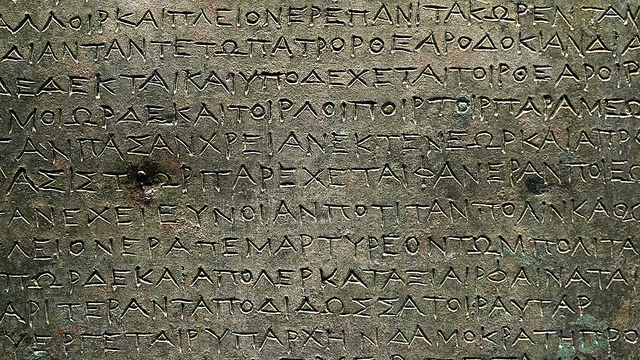
Originally published 16 November 2017.
Sadly, hermeneutics—or exegesis as it was formerly known—is not much in vogue these days. Maybe that reflects the fact that most of us rely on translation for our glimpses into the texts written in ancient (and dead) languages. And the word ‘hermeneutics’ itself needs a bit of exegesis: most understand it as ‘interpretation’, though Aristotle’s Peri Hermēneias actually deals with ‘explanation’.
But if one is to coin a term like ‘Thucydides Trap’, declaring that war between Athens and Sparta was ‘inevitable’, and blame Thucydides for the invention, one should surely check the original text to confirm that ‘inevitability’ is what Thucydides wrote and meant. This is a task that Professor Graham Allison should have undertaken before he pronounced on the contest between Athens and Sparta, and applied it to the more contemporary relationship between China and the United States.
At issue here is how one should translate 1.23.6 of Thucydides’ History of the Peloponnesian War. Allison has apparently used Richard Crawley’s translation, originally published in 1874, as edited by Robert Strassler in The Landmark Thucydides. So Allison amplifies Crawley’s ‘The growth of the power of Athens, and the alarm which this inspired in Sparta, made war inevitable’. This is readable and accessible, but not accurate.
Benjamin Jowett, the great English classicist, theologian and friend of Florence Nightingale, proposed this in his 1881 translation: ‘The real though unavowed cause I believe to have been the growth of the Athenian power, which terrified the Lacedaemonians [Spartans] and forced them into war’.
And not to be outdone, Thomas Hobbes suggested in his 1628 translation: ‘And the truest quarrel though least in speech, I conceive to be the growth of Athenian power; which putting the Lacedaemonians into fear, necessitated the war’. Make of that what you will.
So these three translations suggest three quite different conceptions of the relationship between cause and consequence: inevitability, compulsion and necessity.
Thucydides’ original Greek is dense and somewhat idiosyncratic, which leads to considerable variability in translation. The clause on which Professor Allison’s thesis depends is ‘ἀναγκάσαι ἐς τὸ πολεμεῖν’ (Thucydides, Historiae in two volumes, Oxford University Press, 1942).
At the risk of terrifying non-grammarians and non-classicists alike, let’s pull it apart. The first word, anagkasai, is the third person singular number, active voice, optative mood, aorist tense meaning ‘[as it were] constrained’ or ‘[as it were] compelled’. The verb is related to the Greek noun for ‘prison’ (anagkaion). The optative in Greek is tricky, a fact that Professor Allison might have familiarised himself with, since it lends a sense of the hypothetical to the clause. The second word, es, is a stylistic particle that cues the third word, tŏ, which is the singular neuter definite article serving in this case as a definite pronoun—‘it’. This leaves polemein—an infinitive meaning ‘to fight’.
So the most literal translation of the clause? ‘It, as it were, compelled/constrained [them] to fight’. And to what does ‘it’ refer? Earlier in the sentence, Thucydides identifies the increase in Athenian power and its consequence—Sparta’s fear—as the motivating forces for the ensuing war.
In any historical document, context is everything. A close reading of Thucydides’ History reinforces one of the central themes of his work—that people have agency, they make decisions (or not, as the case may be) and are more or less in control of their own destinies. That, in most respects, is the historiographical significance of The History.
That perhaps explains why Thucydides dismisses the popular views of the causes of the war—earthquakes, eclipses, droughts and pestilence—in the immediately preceding sentences of The History. His point is not inevitability or fate: rather, it is human agency. Just as Pericles had maintained the peace before his death, so others instigated war after his death. Pericles, by the way, died of ‘plague’ (probably typhoid fever), though it would be a bold historian who attributed the Peloponnesian War to the salmonella typhi bacterium.
It’s not just a close reading of Thucydides’ original text that debunks Professor Allison’s theory on inevitability. Professor Arthur Waldron makes a good job of it in his review of Professor Allison’s book.
In his own way, Thucydides was a realist who would have been quite at home with Morgenthau and Kissinger. Professor Allison is more of a determinist, ascribing inevitable consequences to a mechanistic appreciation of power imbalance. Power is often unbalanced. The political question is what people decide to do about the imbalance. That’s the point of The History of the Peloponnesian War.

